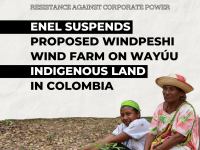Enel Suspends Proposed Windpeshi Wind Farm on Wayúu Indigenous Land in Colombia

Enel Suspends Wind Farm in Colombia
Enel began construction of Windpeshi, a proposed 205-megawatt wind farm in the La Guajira desert on the ancestral land of the Wayúu Indigenous people in Colombia, in 2021. After two years of blockades and protests, Enel decided to suspend construction indefinitely. The company plans to sell the site if it can find a buyer.
“We know these projects will bring development for the country. But if that’s the case, then why can’t they also mean development for the ancestral owners of this land, the Wayúus?” - Jose Silva Duarte, director of human rights advocacy group Nacion Wayúu.
La Guajira
La Guajira coastal peninsula on the border of Colombia and Venezuela is the home to some 400,000 Indigenous Wayúu people. Some 40 wind power farms with a potential total capacity of 8,000 megawatts have been proposed for the hot, dry and windy region ever since Jepirachi, a 19.5-megawatt farm, was constructed in 2004.
Cerrejón
The giant Cerrejón coal mine, operated by Glencore, is also located in La Guajira. It has displaced the local Wayúu peoples, polluted their lands, and brought violent armed groups to the region for over 30 years. Despite the fact that the mine is highly profitable, the region is one of the poorest in the country, and has made locals deeply suspicious of outsiders.
Enel Colombia
Enel Green Energy is a subsidiary of Enel, the Italian former state-owned fossil fuel company that was privatized in 1992. It has several wind and solar projects in Colombia. Windpeshi was approved in 2020 to operate on 6,145 hectares of land in the Maicao and Uribia municipalities. About a third of the construction has been completed so far.
Land Grab
Leiji Hana Gonzalez, a Wayúu mother of two who now lives in the city of Riohacha, says that her family was intimidated into leaving their village where they had lived for 40 years by their armed Wayúu neighbors who wanted to get higher compensation from Enel for the Windpeshi project. She says that grenades were thrown at her house, and her aunt was shot and killed.
“Our territory is priceless. They can give us all the thousands and thousands and millions, but we will still not be well paid. Our wealth is in the land. Our wealth is in the sea. Our wealth is in the air. How are we going to get rid of what is ours?” – Nancy Gomez, Wayúu Indigenous leader.
Resistance
For the last two years, Wayúu leaders have blocked local roads, stating that the wind power companies had failed to consult or compensate all the impacted families. They were back by Nacion Wayúu, a local human rights group. Despite the fact that the ministry of mining and energy negotiated an end to the protests in May 2023, Enel decided to pull out of Windpeshi shortly after.
Company response
“Projects have to be sustainable not only from a social point of view but also from an economic point of view, and their success depends on joint work between companies, institutions and communities.” – Eugenio Calderon, Colombia and Central American manager for Enel.
This is #52 in our series of Instagram infographics on resistance against corporate power.
Click here to see the full post on Instagram.



